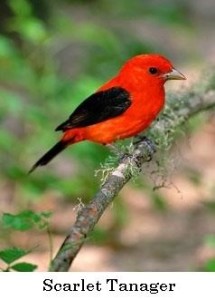For a bird lover like me, there is not finer time to be out watching wild birds than during Spring migration. The wood warblers have arrived as they settle in to breed or more likely, carry on further north to do so. Their fabulous colors and patterns, their diminutive size and their fascinating song all combine to keep me in awe of their journeys from Central and South America.
As joyful as it is to watch them, it is also heart breaking to know that millions of song birds are lost yearly as a result of the actions of humans. One of my mentors in the world of birding and environmental awareness was Fred Charbonneau. He loaned me a book, Silence of the Songbirds, by Bridget Stutchbury. For you fellow bird lovers’ out there, I heartily endorse this book. Not only did the author set forth a very interesting read as to the various topics, solutions were offered to the challenges faced by migrant birds. Here is her version of Ten things You Can Do to Save Songbirds.
1) Buy Shade Grown Coffee – Forest songbirds that lived in the tropics often live in traditional coffee farms where there are plenty of trees and food for birds. Most commercial coffee comes from sun coffee farms that have few trees and use lots of fertilizers and pesticides. Buy accordingly and make sure your coffee shop is aware of your preference.
2) Buy only organic produce from tropical countries – Tropical countries use large amounts of pesticides that are highly toxic to birds, including chemicals that are banned or restricted in North America. Non-organic banana plantations use one of the highest pesticide loads of any crop. Buy accordingly and make sure that your grocer is aware of our preference.
3) Buy organic for crops with heavy pesticide use – some crops in North America are relatively dangerous to birds because of the type of pesticide used. Crops such as potatoes, corn and cotton pose a chemical threat to birds.
4) Buy wood and paper products certified by the Forest Stewardship Council (FSC) – Companies certified by the FSC use sustainable logging practices that help make sure the boreal forest will always be a home for the billions of songbirds that nest there. In my experience, few lumber sellers are aware of FSC and I spent a great deal of time educating them when I was attempting to make a purchase.
5) Buy paper products made from recycled paper – The boreal forest is being cut down to fuel the enormous demand for paper products (toilet paper, paper towel, mail-order catalogs, cards). Buy accordingly from the many choices that are available.
6) Turn city lights off at night during migration – Many songbirds migrate at night and are attracted to city lights, which they think are stars. Millions of songbirds die every year after getting trapped among our towering skyscrapers. Encourage your building owner to comply during migration – mid-March through June. Handouts regarding this issue available at Wild Birds Unlimited.
7) Reduce bird-window collisions – Birds cannot see glass and fly toward reflections of trees or toward what looks like an opening in the wall. Place bird feeders very close (less than two feet) or very far (more than seven feet) from windows to reduce fatal injuries to your visitors. Consider adding Window Alerts to your windows that are the source of strikes. The material that the Alerts are made of act to give birds a reference to the presence of glass.
8) Make your backyard bird-friendly by planting shrubs and trees – During migration, tired and starving songbirds will land almost anywhere in search of a safe place to rest and eat. Invite them to your backyard by offering cover and fruiting trees and shrubs, preferably native. Reference the growers of native plants at the Michigan native Plant Producer Association handout available at Wild Birds Unlimited or at www.mnppa.org.
9) Keep your cat indoors – An average outdoor cat kills about one songbird per week, so a typical community with a hundred cats that roam outdoors will kill over 1,000 songbirds during the breeding season. There are over 75 million cats in North America! If your neighbor has a cat, give them the brochure Cats Indoors, available at Wild Birds Unlimited or at www.abcbirds.org.
10) Go pesticide-free on your lawn – The ingredients in many lawn and garden pesticides are moderately or highly toxic to birds (e.g., acephate, malathion,dichlorvos) There are a number of landscape companies that are pesticide free. Contact local Motion at 313-881-2263 for company information.
Although it would be ideal if all readers could embrace and effectuate all of these changes as well as inspire others to do so, remember that every journey begins with a single step. Choose one, choose all, but I hope that you make a choice to make a difference.
Enjoy your birds!
Rosann
Wild Birds Unlimited of Grosse Pointe Woods, MI

